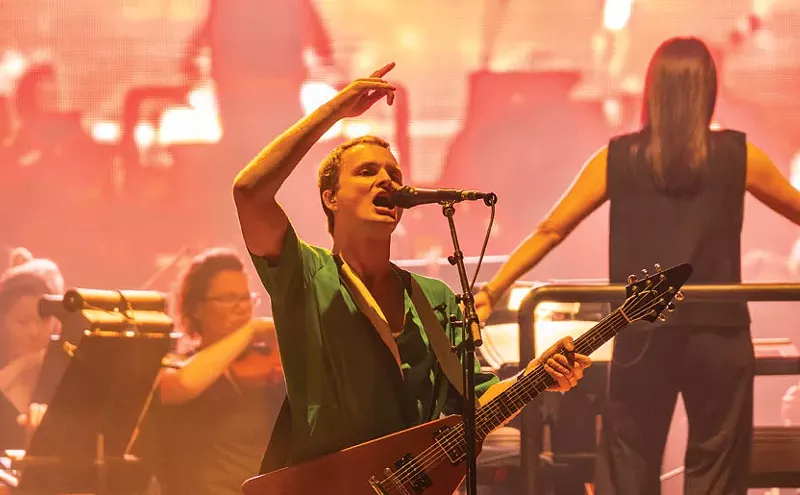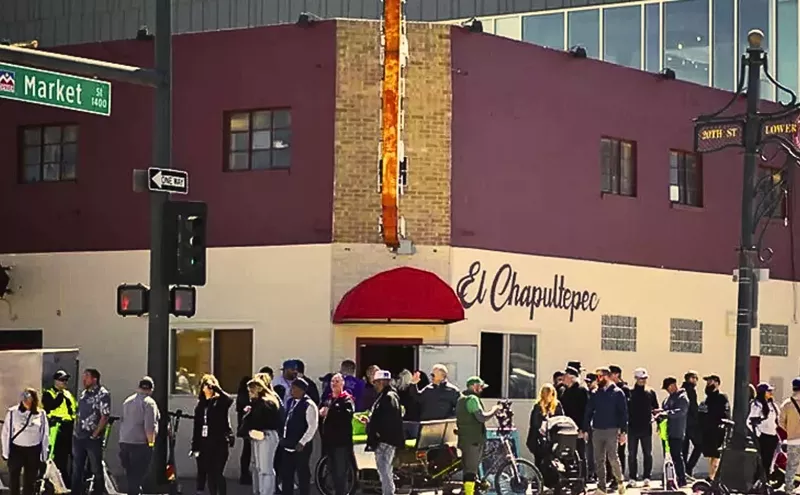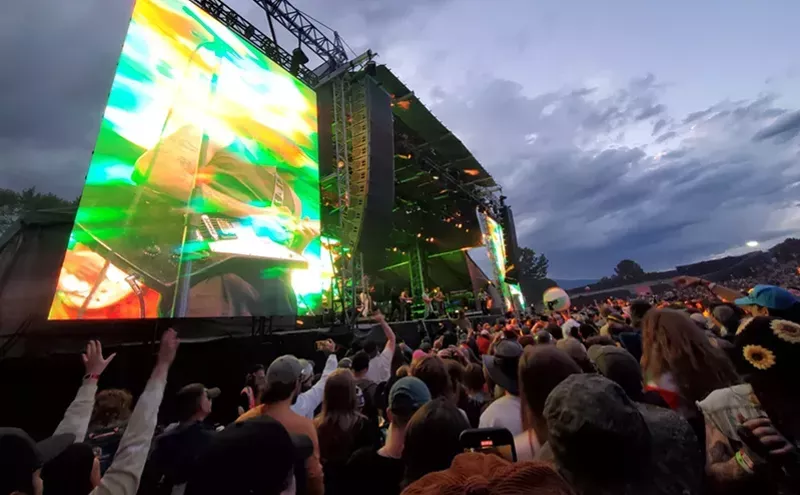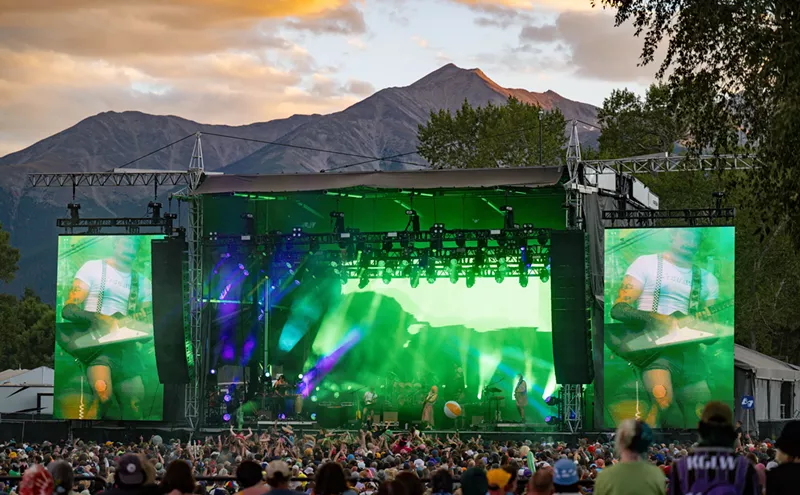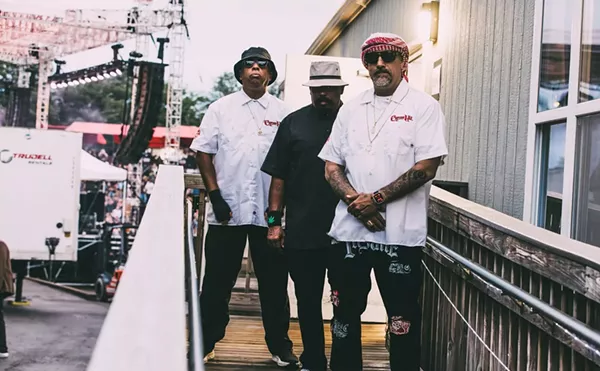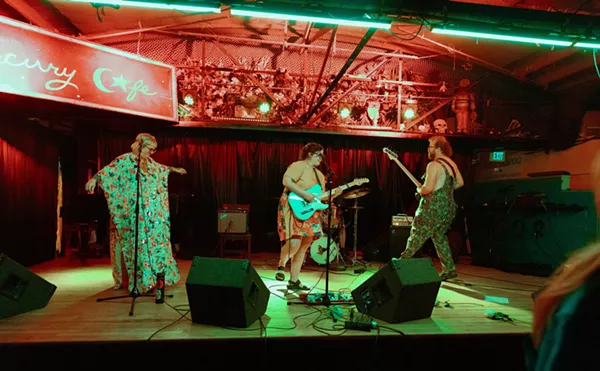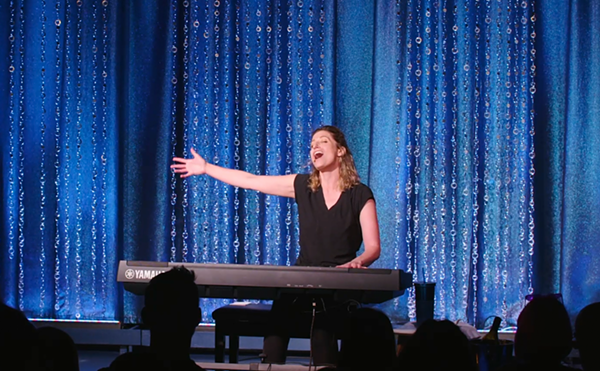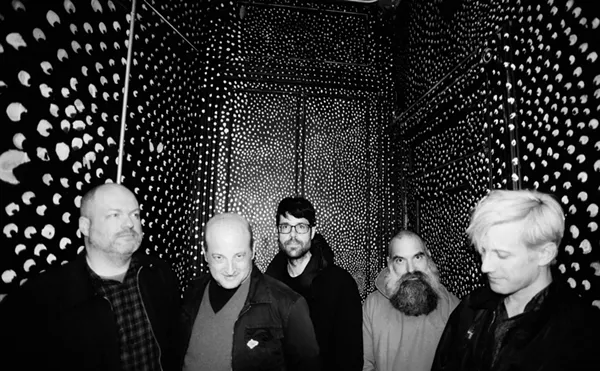To the passionate protesters whose heels are dug in, however, the impetus couldn't be clearer. The displaced have been galvanized by their collective disillusionment with any number of issues, utmost, the systemic failures of Wall Street and the subsequent absence of accountability.
There's also a pronounced exasperation with corporate lobbyists and the brazen sense of entitlement being flaunted by corporations that hide behind corporate personhood. Those things, coupled with a very real frustration with the lack of employment and affordable healthcare, plus rampant social injustices, have brought the masses together under one banner.
As the movement continues to evolve, the focus appears to be getting sharper and sharper, and it's finding an incisive voice thanks to a groundswell of musicians across the country championing the cause. Locally, a growing collective of MCs, Sole, Molina, Mane Rok and Kalyn Heffernan, have been the most vocal and visible of those advocates, both on site and online.
Jamie Laurie (aka Jonny 5) is among those raging against the machine. When we reached out to the Flobots frontman earlier this week to get the latest word on his group, he drew our attention to a video that was about to drop related to the Occupy Movement, revealing that he had been enlisted by Mane Rok, a dependably outspoken MC, to contribute to a fittingly titled Occupy-centric track called "99th Problem."
Westword: I wanted to get your thoughts on the Occupy Movement. How do you feel about the overall Occupy Wall Street Movement, and how do you think Denver figures into the whole equation?
Jamie Laurie (aka Jonny 5): I look at this all from a sustainability lens. It's no secret that we have a huge challenge as an earth right now, given the limited resources, given the global warming, given unknown quantities of oil that are left, and we have to undergo a period of transition.
We have to change our habits and change all of those things. And I think the structure of corporations being such the extreme of only having -- corporations, who, by design -- are only there to maximize profit and maximize the rate of profit are not helping us. And it takes a whole lot to stand up and change that system, and it's hard."We no longer have this kind of immature, knee-jerk, anti-government thing. Suddenly, it's about questions that are too big to solve by one short list of demands."
The Occupy Wall Street movement, without any sort of professional organizers -- it's not been organized by the professional left -- they hit on something. And they figured out: Occupy Wall Street -- this meme captivates the nation and the world's imagination. And they did it. And they've changed the conversation. We no longer have this kind of immature, knee-jerk, anti-government thing. Suddenly, it's about questions that are too big to solve by one short list of demands.
So, I mean, it is a little bit of a Rorschach, because I'll name what I think are the top three or four issues of the Occupy movement, and someone else will name a different set of issues. But they won't be completely different. Because, obviously, Occupy Wall Street means: Hold Wall Street accountable, or something to that effect. Talking about the 99 percent and the 1 percent -- that's very intuitive: It's about income and equality. We know that that's not healthy. It's not good for democracy, and it's not fair.
And then other things like abolishing corporate personhood. I think that's such an esoteric thing that's been difficult to popularize, but now everyone's talking about "are corporations people." That's such an incredible favor for this country that the Occupy Movement has done. So I'm really inspired by it, and it's been inspiring to have that happen as a backdrop for writing a lot of the songs on this album.
Do you feel like the political climate is similar to when you came out with Fight with Tools?
Yeah, I really do, actually, and that's a good observation. Fight with Tools felt like there was a lot of agreement -- that was 2006-2007, when we were writing it, and it felt like, "Look, we know we're against this war, we know we don't like this president, we know we dream of kind of a different country - we just need to activate ourselves, just to galvanize and mobilize and sort of assert that conventional wisdom."
And Survival Story, we wrote at a time when it was, frankly, pretty confusing for a lot of people: Oh, we have this guy in office that a lot of us feel good about. He's an anti-war candidate, we think, but everything's happening slowly or not happening at all, and should we be mad at him, or should we give him time? I think everyone was just a little bit confused. What we did was we looked at the big picture of just what are the global challenges, or whatever.
And right now, it feels again, like, look, we kind of know what issues need highlighting. Now it's time to mobilize ourselves. So yeah, it's actually been really incredible just to be writing these songs while this movement is happening in real time, everywhere around us.
It just seems oddly -- and eerily -- similar, just the climate of disillusionment and the general synthesis of people and ideologies coming together, as it was during the DNC. Like after the show that you guys played with Rage Against the Machine at the Coliseum, when you marched from the Coliseum to the Pepsi Center, it has that same sort of defiant iconoclastic sort of sensibility to it. People are, quite literally, raging against the machine. It feels very similar in tone and texture, just the tenor of things.
Exactly, and there's such an important thing that's happened -- I remember reading an article that said, "When Republican presidents are in power, the music gets really good because it's protest music and it's full of, you know, channeling that angst. And then when a Democrat's in power, you get crappy, pop, like, we just want to have fun music."
I read that when Obama was coming into power, and I thought, well, is that what's going to happen? And it's kind of neat that this is transcending that binary, because that's always what I felt, and I think I heard a lot of people saying needed to happen. We can't just say, "Okay, now we have Obama in power. Now we can just sit back and relax." We have to hold him accountable.
We have to have a movement that's bigger than a candidate. And that's what people were saying, but it wasn't happening. But now it's happening. It's almost as though Obama's irrelevant; the Republicans are irrelevant, and there's other question of this movement at center stage. And everybody else, are they going to respond to those concerns the movement's bringing up or not? I think that's really important, because if we get stuck in the binary of the two parties, then we're confined to the narrow range of things that they want to talk about.
Early criticism of the Occupy Movement has centered on the perceived nebulousness of the proceedings, how there was no list of demands and the fact that there didn't seem to be a focal point for the movement other than just a general sense of disenfranchisement among the masses.
How much do you think the movement itself is based on and inspired by the Arab Spring, and the whole idea that you don't necessarily have to have a focal point, as much as it serves as vehicle for people to have their voices heard until it reaches critical mass?
With the Arab Spring, people occupied various city squares until they eventually toppled regimes. The Occupy movement seems to have started like that, but now it seems like it's become a little less abstract and a little more focused, would you agree with that?
I absolutely think that this wouldn't be happening if it weren't for the Arab Spring, because it was so magnetic, what happened in Egypt, it made everyone want a piece of it. And as a tactic, this occupation, maybe we weren't visualizing it, like we didn't really think it was possible. I mean, we can't even get people together for a rally. How are we going to get them to stay?
And so I think you're exactly right: That was the thing that captivated our imagination and allowed us to imagine this. The whole question of whether the nebulousness is good or bad, I think everyone loves to talk about it and think about it. I think it has been primarily good, but I certainly think that right now, Occupy has a solid foundation that's in everybody's imagination. It's in all of our consciousness. Now there's so much that can be grown from it. So I think, for me, it's a time to start thinking what are the different ways that can evolve, what are the different things that can spring up from this soil of Occupy.
It kind of has the trappings of a filibuster, where it was just kind of filling the gap...
Can I just say what you say to me and I get credit for it? Cause you're thinking this shit through, man. [laughs]
It just kind of seems like it was the social equivalent of a filibuster to fill the space and keep the dialogue going until the tacticians and the more vocal members of the movement could formulate the next move and pinpoint what the focal point is. It kind of seems like that still hasn't taken shape, but the abstract nature of it is becoming less so.
It's slowly starting to take shape. It doesn't seem like such an abstract concept anymore. I remember when the movement first started, the direct criticism was, "What the hell are these people doing? They're just basically showing up." And so it kind of seems, for lack of a better parallel, like a social filibuster. Would you agree with that?
Mm-hmm. It's genius, right? And that's why it's been important because it had to be... I was talking about it as an anchor -- the job of Occupy is just to stay put in its position and say, "No!" And most little reforms that will, or could be happening, aren't going to be enough, and it's the job of Occupy to say, "That's not enough."
I had the privilege of spending the day with Jim Lawson recently. He was the architect of the Nashville Sit-Ins. He was basically the same age as [Dr. Martin Luther] King. Maybe one of them was a year older. He spent time in India, before he met Martin Luther King, and they were peers. He was basically the most respected teacher of non-violence during that time period, and he's never stopped.
He emphasized to us that those things took twenty years to change, from the beginning of the movement to desegregation, the segregation signs being taken down. The "Whites Only" signs, that didn't change for twenty years, and that's just some signs.
That's just a system of social apartheid. That wasn't financially threatening people in the same way. So some of these things being talked about, like abolishing corporate personhood, could require a constitutional amendment or a constitutional convention. Those types of social movements take a lot longer, but it's more transformative. But it's exactly the type of work that needs to be done this century.
It was kind of groundbreaking for me to be thinking on that level. Like, this isn't about what happens six weeks from now or the next presidential term. This is about what happens over the course of the second half of my lifetime. And so taking a stand that is bigger than a set of demands is very important.
Right -- that's the challenge: How do you keep people engaged once the novelty wears off?
I think it's the culture, the culture that's being built up, the sub-culture, which is actually the thing, the stepping stone, that led me back to music from when I was just doing youth organizing. Sub-culture, that's a powerful thing. That's part of your identity. That's something the kids adopt and it becomes them. I think we're going to see a sub-culture -- we have seen it, and we're going to see it continue to grow out of the Occupy Movement.
One of the most profound things that really helped exact the focus, for me, that I heard somebody say: Sole said something in an interview that we did with him that struck me, when he was asked about abstract nature of the movement.
As he kind of advocated for non-violent activism, he was basically making a point of the fact that it made indeed seem abstract right now, but there's so many us -- and I'm paraphrasing poorly here -- but there's so many of us that you cannot ignore this movement.
And we're going to keep going until there's so many of us that we've reached critical mass where they have to send in the troops to intervene, and bring them home to disengage this movement. And that, to me, was pretty profound. He put it in perspective in a way that nobody had really been able to fully articulate yet at that point.
That's a very beautiful image. He was -- and you know this -- he was down there day in and day out. I've been down there just a few times here and there, but it's been inspiring to see the people who've been at the hub and at the core of Occupy Denver. The times I have been down there, every single time I would see some kid that I don't know wearing a Flobots bandana, a few people that I know very well from working with Fight with Tools back when it was street teams all across the country -- the community is there. Our community is there.
And I've always felt like it was a two-way street between our audience and fans and us. When we're doing the music, sometimes it keeps us from being at the center of the activism. But to see the folks doing the activism and knowing that they're connected to us in some way, it makes doing the music piece feel worthwhile. It feels like we're working in tandem.
It's been really inspiring seeing Sole or someone like Boots Riley in Oakland that have been right at the center of it. And the video that Mane Rok organized, did you get a chance to see it?
Yeah, it's powerful, man.
Pretty good, right?
What do you feel like the primary thing that has been galvanizing the disenfranchised, the one thing that links everyone together. Obviously folks are upset with a lot of things in the country. But what do you think the common ground is for everybody?
I think what's amazing about it is that it wouldn't be possible if there wasn't already vast amounts of agreement on more than one thing. I don't think it's just about jobs. I think it's about this conventional wisdom that's at odds with the existing order. I mean, nobody likes big money in politics. No one likes unlimited corporate money in global advertising. No one likes the idea of corporate power being unchecked globally, and no one likes the idea that Wall Street hasn't been held accountable for the crisis.
And I think corporate personhood, I seize upon that sometimes, because it's just such a common-sense gut reaction: A corporation is not a person. Why are we treating it as one? I think it's a testament to the work that's been done on the level of conversations, things like the Daily Show.
This conventional wisdom had to develop, and it was developing slowly through all of the things that you can't quantify. And it just reached a point where all it took was this little spark, and everyone agreed and took action.
There's such a polarization between the different classes. The dissolution of the middle class is a very real thing. It seems like you're either economically depressed, living paycheck to paycheck, or you're wealthy. When we were growing up, there was a very clear designation of being middle class, and it seems like there's been a complete dissolution of the middle class. It doesn't really seem to exist anymore. So I think on that level, fundamentally, when you dissect this movement, that is the driving force for this. It's a class war. We had race inequality in the '60s. We now have class inequality in the modern era. I think fundamentally that's what we're talking about here. Would you agree?
I think so, but I'm also inspired by the full spectrum of the people that have been involved. There's people involved because they're students who see only that they have no jobs and no future. But there's also people involved, people I know, who are saying, "We're part of the 1 percent. We stand with the 99 percent." And it's very much about principle. I mean, the police chief in Philadelphia was arrested. It affects his pension.
Maybe the first wave of reaction was this gut, irrational anger. But now I think it's a little more thoughtful and focused. This is where we make sure that we don't just let it go and say, "Well, let's just continue and let it happen again."
Do you think the movement has the sustainability to last through the winter and into the summer and into next year?
Absolutely. I thought maybe we'd start to see the end of the first phase by now and people would sort of start to strategically cede and regroup and figure out phase two. But I think what's becoming clear to me is phase one is not going end. The physical occupations are going to remain in some way, shape or form. And the second phase is going to grow organically from that. Because part of the thing when you have homeless that are part of the movement, organically and genuinely, they can occupy for a long time.
What do you think the second phase is going to involve?
I don't know. I really don't know. I want to put some thought into it, but I think there's small ideas bubbling here and there. I mean, some of the places where people are occupying homes. There's actually a place in Atlanta where the Occupy Movement heard about a police officer who was being evicted, and they were occupying that police officer's home in solidarity with him and his family to keep them from being evicted and foreclosed upon. I think occupying physical spaces or people's homes who are being threatened with foreclosure, I think that's the logical next step. I don't know if that's the next full evolution of it. I think there's a lot of possibilities from within it.
How do you feel about the fact that -- and it was inevetable; it was going to happen sooner or later -- that corporations are actually starting to embrace the term "occupy" and using it as part of their marketing in a sort of dismissive tongue-in-check sort of way. I don't know if you heard the Kia commercial that's basically playing off the whole Occupy notion, and they're using it as the focal point for a marketing campaign. How do you feel about that?
Local Occupy Grand Kia radio Commercial
I actually think it only makes it stronger. That always happens with everything, but it shows that it's real. It's like when they started advertising that embraces same gender couples being married. That shows that it has now been institutionalized. For me, any sign of how real this movement is makes me personally optimistic. So hearing about that ad makes me excited.
Now do you think that it institutionalized it, or do you think it trivializes it? I kind of think at some level it kind of trivializes it in the minds of everyday Americans that really haven't wrapped their heads around the movement."The primary focus is an alarm bell to say: "This system is not sustainable. Something is wrong! Something is wrong! Something is wrong!"
Yeah, sure, it can do that, too. I haven't seen that particular ad, but I think the visibility is a good thing, because I actually think what happens, even when Occupy gets depicted as turf battles with the police, I think what happens is the people watching that might say, "Yeah, I'm not going to go out there. Those people are just fighting with the police."
But the issue of 1 percent versus 99 percent is in their vocabulary. The question of Wall Street accountability is in their head. And so I think even people that might disparage of trivialize Occupy as a movement, or mock it, or whatever, also have been reached by its message.
I think the goal of the movement is ultimately to be present in the minds of the 99 percent -- and that includes the police. A really important step will be finding creative ways to reassert that this movement is actually being done -- even when it's clashing with police -- it's on behalf of police and firemen and other workers whose pensions are threatened by Wall Street's recklessness.
Critics of the movement have also claimed that this is basically just an advocacy for socialism. How do you feel about that?
Certainly the ideological diversity in the group -- you have folks that are more socialists, you have folks that are more anarchists, folks that are more libertarian, people that are traditional Democrats and Republicans. I think the whole range is there.
Would you say that this is a non-partisan movement?
Yeah, it's certainly non-partisan in that has no love for any political party, especially not Democrats or Republicans. The primary focus is an alarm bell to say: "This system is not sustainable. Something is wrong! Something is wrong! Something is wrong!" We know what's wrong: There needs to be accountability on Wall Street. Corporate money needs to be removed from politics. So it's sounding this alarm over and over and over until the fire is put out.
What do you feel is going to be the natural conclusion of this? Obviously, during the Arab Spring, regimes were toppled and change came about. Although in Egypt, as we're seeing now, they're having to re-engage in similar demonstrations that they had before because they're not satisfied with the changes that have been made. But ultimately, the endgame has been regimes have been toppled and change has been activated. What do you feel like the eventual conclusion of this is going to be?
I think that fundamentally over the next decade or two, the people in this movement are having transformative experiences that are going to make them the leadership. They're going to continue to grow new leaders. The conversation is going to continue to grow and evolve.
And I think the endgame is fundamentally examining the role of money and corporate power in our political system, fundamentally examining how our economic system does and does not meet the needs of people on Earth right now. I think it's that big of a conversation.
And I can easily see a constitutional amendment being part of it, around corporate charters, corporate personhood. I know there's an Occupy amendment being introduced by someone from Florida. But I think it's going to be a decade to two-decade-long conversation about how we create an economic system that's realistic and sustainable for our actual Earth.
One final, semi-related question: Do you have any political aspirations? Do you ever see yourself running for office? Is that something you even aspire to, or do you see yourself more as a career activist?
Right now, I see myself as a rapper and an activist. But it is kind of interesting. I've always thought about people who start as musicians have all this leeway that someone who started as a politician never would have. But I would need to do a lot of work if I was in that realm, if I was ever going to consider something like that.
So is that something that you aspire to at some point? You're clearly a thoughtful, articulate and intelligent person who is very immersed in the political landscape. Is that something that you can see yourself pursuing at some point?
I've never had fantasies about it. But I would really have to try. I can envision it someday far in the distant future. But I can't see that far ahead right now.
Fair enough.
You like that? I was practicing my political answer.
That was about as a political answer as I could've hoped for.
Any speculation made about anything is just good for the band. [laughs]
Speaking of the band, I hear you're in the process of recording a new record.
We are indeed. Today I was just in what ended up being a lengthy meeting. I listened to the first round of songs and the first round of mixes. So we actually have a bunch of songs tracked, and we're just in the mixing phase.
You're recording up at the Blasting Room again?
Yeah. It's been pretty fun, man.
Do you have a title yet?
The tentative title I was telling people before ... we have several titles, is the real answer. Not only do we have one title; we have several. [laughs] We're like two weeks away from having exciting details for you. But I can tell you it's really awesome.
Have you changed directions a little bit? What can we expect from the new album?
I actually feel like it's a nice balance between Fight with Tools and Survival Story. I mean, thematically, it really picks up right where Survival Story left off. One of the songs is called "The Circle in the Square." It came from looking at the Arab world and how people have always said, "You can't have democracy in the Arab world. You can't square a circle." But then at the beginning of this year, you had a giant circle of people in the middle of Tahrir Square that became emblematic of this energy that's now taken over everywhere.
And so we're sticking with that energy of, you know, we have to sort of stop the apocalypse that everyone thinks is coming, but I think the songs go in a whole lot of different directions. We had some fun with Nathaniel Rateliff. He came for a day to record some stuff. Paper Bird was up there. We worked more with some Denver artists.
Are you guys financing the whole thing yourselves this time around?"I think the industry as a whole, in many ways, is crumbling. It's not crumbling for artists. It's crumbling for the industry."
Yeah, and that's been exciting just to do it on our own.
Do you just save up money and pool your resources or how are you financing it this time?
We just made it a priority, and now we have this album that's ours. We'll kind of feel it out and see if there's people that want to be involved in the process of helping us put out an album, but maybe we don't need them. Maybe we do.
On this side of things, since you've obviously moved on from your relationship with Universal, what things have you learned from the experience, what things have you taken away, and how does the whole thing look now in retrospect?
Well, you know, I think the industry as a whole, in many ways, is crumbling. It's not crumbling for artists. It's crumbling for the industry. So it feels really good and freeing to be on our time table. I think from an artistic standpoint, it's a psychological game. When there's someone else involved, it affects you, even if they don't affect you. If you're spending your time making sure that you're not making a song that somebody else would want you to make, it becomes this weird sort of mind trip.
And there's no mind games right now. It's all us. It's all about the music we want to make. The Blasting Room is great. They listen to us. They say, "What's the vision for the song?" and they help us implement it. I think, in many ways, we feel all of the perks and benefits and responsibilities of being completely independent.
You've undergone a number of substantial changes, from being on a major label to being independent, like we talked about, and being self-sufficient. You're not doing a great deal of touring. Is that something that's in the cards for the future.
Oh, sure. Our focus has been just making this album. We actually went to Europe and had an unexpectedly great following in Europe. It was people for whom Fight with Tools had just sunk in. I think we started to understand that that timeline is different. Our last big tour in Europe had been -- not just in the U.K. but also Germany - just after "Handlebars" had hit big in the U.S.
There was a burst of people in the U.K., but people in Germany didn't know about it. So this last time back going to Paris and a number of different places, it was really fun. We have Flobots fans in Europe waiting for us to come back. But that's the only tour we did this year. The rest of the year has been focused on the album.
So what are the benefits of being an independent artist now?
We got this flash of attention through our major-label era. They spent quite a bit of money on marketing. So people know our name, or they know our song, or they know our branding, or they know us in some way, shape or form. Now it's our job to follow up with another song and album.
You know, it's interesting: Our second album, once people knew that we were independent, I feel like there was this retroactive effect by most critics saying, "This second album was much stronger, and it really wasn't a major label, commercial thing, and that's why it didn't sit well with Universal." I don't know if that's...
I think major labels are a lot more complicated. That's one thing I guess I learned from being on Universal: Labels aren't sitting there saying, "Don't make political music." They're excited if you make political music -- if it sells. I think, for us, the obvious exciting thing is just to be completely free and completely on your own time and to really know that you are in charge of everything you're doing.
Survival Story really was a much stronger record. Thematically, it was very intricate. There were a lot of layers to unfold and that sort of thing. Did you feel like there was a disconnect with the label, that they just didn't get what you were going for, like it was perhaps a little too dense for them? What's your perspective on that?
I think Fight with Tools was anthemic, and it was designed around slogans, and so it was received that way. So it has the accessibility of an album that is about slogans and anthems. Survival Story, one of our influences, Stephen and I, when we were writing songs, was Borges, the author. We wanted to create a song that was intricate and layered. It would be hard to understand at first, but then you read into it and you found all these hidden treasures. And so we did that.
And now we're doing an album that's actually a really neat combination of those. We've laid down this tapestry of mythology for the hardcore super fans - so there's things where we can just say one word, and people say, "Oh, you're talking about 'giants' and 'phantoms,' we know what that's about. We know the back story."
But the typical listener is going to listen and go, "Oh, these songs are really accessible." So I guess on the artistic arch, I feel like everything we've done has been deliberate in a way that I think will also be very accessible. But I don't know. I've only heard the songs myself. I don't know what people will think, but I really like these songs a lot.
The other thing is you're producing this one yourself, right?
Right. Right.
So how is that process compared to making your previous album?
Well, you know, Mario C was pretty hands-off. He was not overbearing in any way. And we knew we needed somebody who wasn't overbearing. So it's not feeling that different. I think one thing that's nice is the folks at the Blasting Room are great, and having them work with us is really good. They're great as co-pilot. Really all we've done so far is we've tracked it. Right now we're in the mixing stage.
So how have things changed musically without having Andy [Guerrero] in the fold?
Every lineup is completely different, but there's opportunities in everything. I don't know. You'll hear it.
Do you have somebody else taking over guitar duties, or is there no guitar on the record? What's the construction this time?
There may be some guitar. It's a little too early to say. But for the most part, it's a little sparser sound. We'll have some songs out there soon. Any attempt to describe the sound, I realize, is always a failure.
Do you have a release date?
We don't. Sometime in 2012. We're really tunnel vision on finishing the album and kind of sharing what we have, maybe create a little buzz around what we have.
Related Links:
- Flobots no longer on Universal Records
- Moovers and Shakers 2010, More of Our Picks (12/27/10)
- Moving Pictures: Flobots CD release at the Ogden Theatre (3/12/10)
- Interview: An in-depth Q&A with Jamie Laurie prior to the release of Survivor Story (3/12/10).
- Poptimystic: Will Flobots new Story resonate as much as the last one? (2/10/10)
- Live Blog: Tent State University Music Festival to End the War (8/27/08)



